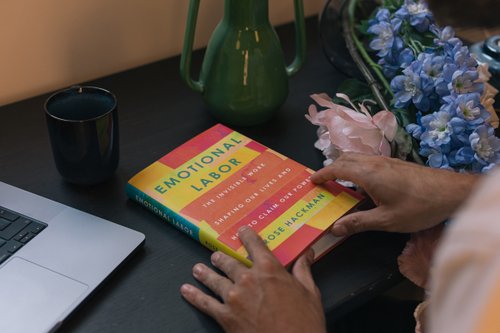Stress at work is contagious … Try not to catch it
15. 2. 2024
3 min.


Journaliste - Welcome to the Jungle
Did you know that just like a cold, stress is airborne? Let’s see how we can protect ourselves from catching it at the office.
Whether or not you believe in good or bad energy, there are times when you have an instant connection with someone you’ve just met and times when you completely clash with another. It’s about chemistry, and it happens when two people are close to each other and they either attract or repel. If we’re repelled, is this reaction an unconscious way of protecting ourselves? Recent research published in the 2023 Journal of Personality and Social Psychology suggests that stress is as contagious as a cold. Being near someone who’s stressed out could make us feel that way too, so should we distance ourselves from one another at work?
Our brains gravitate toward negativity
You might wonder why stress affects us so easily. According to the stress study referenced earlier, humans have the unfortunate habit of assimilating or mirroring the emotions of other people. This isn’t a new concept; even animals do it. One study found that dogs mirror the stress levels of their owners. Stress triggers the release of cortisol, a hormone that regulates our bodies during a new or dangerous situation. Cortisol increases alertness, reduces immune defenses, and makes us nervous or irritable.
Our brains, which are wired to flee from danger just like an animal’s, work like this: when we’re around someone who reacts with sadness, fear, or distress, we unconsciously tell ourselves that this is the way we should behave too. Fortunately, we don’t fear predators much today, but psychological insecurity remains. Elaine Hatfield, a psychology professor at the University of Hawaii says, “Primitive emotional contagion has an adaptive and functional role that promotes social closeness in the human species.”
However, this emotional imitation takes on negative emotions first and foremost with survival being top of mind. As psychologist Rick Hanson states, “The brain attaches to negative emotions like Velcro and rejects positive emotions like Teflon.” In other words, “negative emotions are more contagious and last longer,” says the author of Emotional Contagion, Christophe Haag, in the French journal Sciences et Avenir. It seems that humans are fundamentally against the law of attraction. While it’s true that negativity attracts negativity, positive emotions are overshadowed by the negative.
Compassion fatigue or empathetic distress occurs when a caregiver loses the ability to feel compassion for a suffering person because they are too psychologically affected. The struggles of someone else have become so overwhelming that caregivers forget about themselves entirely.
Protect yourself from stress at work
It’s difficult to avoid stressed-out people. They’re everywhere: in traffic, at the grocery store, on public transportation, and at work. According to a study on empathetic stress, 26% of people observing someone who was stressed had significant cortisol increases of their own. Maybe your coworker had a rough weekend and transmitted their stress to you at the coffee machine, so be aware of the symptoms of negative emotional contagion which include low morale, a weakened immune system, and stress.
It’s possible to protect yourself from others’ negativity without locking yourself in the house. For example, you can practice mindfulness when your body tenses up and you’re suddenly overwhelmed by stress. Ask yourself, where is this coming from? Do I have a real reason to be stressed right now? These questions can help you take a step back and make it easier to identify potentially contagious people around you.
Has everything been going downhill since you changed workstations at the office? Maybe your deskmate’s unhappy love stories are starting to weigh on you. Don’t ignore him, but balance this influx of negativity by having lunch more often with another colleague, the cheerful one on the team. Specialists agree that surrounding yourself with positive people is a good defense against negative emotions. It seems that we are the average of the people we spend the most time with. It can be helpful to think about that when reflecting on your work relationships.
Regularly being in nature and around plants and animals significantly reduces stress, anxiety, and anger. A study of London residents revealed that people living on greener streets took fewer antidepressants. So the next time someone suggests taking a walk in the park when you’re feeling down, push yourself to get out there and do it.
Translated by Lorraine Posthuma
Photo: Welcome to the Jungle
Follow Welcome to the Jungle on Facebook, LinkedIn, and Instagram, and subscribe to our newsletter to get our latest articles every week!

Další inspirace: Duševní zdraví

‘We need each other’: Monika Jiang on combating loneliness in hybrid work
Hybrid work offers flexibility but can leave us feeling disconnected. Monika Jiang explores how we can rebuild workplace connections.
19. 12. 2024

Struggling at work? Here are 3 steps to rebuilding your self-esteem
Low on confidence? Learn how reflection, recharging, and refocusing can help you rebuild self-esteem and thrive professionally.
27. 11. 2024

10 ways to beat the Sunday Scaries
Even people who love their jobs can experience the Sunday Scaries. Psychologist Karen Doll offers several strategies to help manage and overcome it.
12. 9. 2024

Unpacking the burden of emotional labor
Rose Hackman’s "Emotional Labor" reveals how managing emotions impacts everyone, especially women and minorities.
08. 8. 2024

Is financial anxiety harming your productivity?
Feeling overwhelmed by financial anxiety? You're not alone. Discover practical steps and expert advice to regain control of your work-life balance.
31. 7. 2024
Zpravodaj, který stojí za to
Chcete držet krok s nejnovějšími články? Dvakrát týdně můžete do své poštovní schránky dostávat zajímavé příběhy, nabídky na práce a další tipy.

Hledáte svou další pracovní příležitost?
Více než 200 000 kandidátů našlo práci s Welcome to the Jungle
Prozkoumat pracovní místa